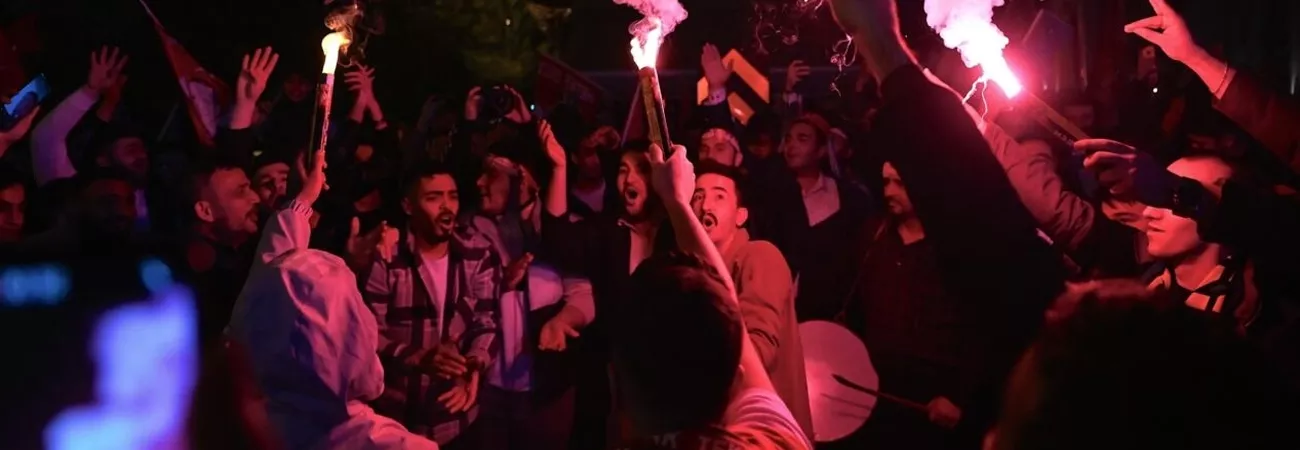i NEWS INTERNATIONAL
Turkiye braced on Monday for its first election runoff after a night of high drama showed President Recep Tayyip Erdogan edging ahead of his secular rival but failing to secure a first-round win. Erdogan sounded triumphant as he emerged before a sea of supporters shortly after midnight to proclaim himself ready to lead the nation for another five years. Almost complete results from Turkiye’s most important election of its post-Ottoman era showed Erdogan — in power since 2003 and undefeated in more than a dozen national votes — falling just short of the 50-per cent threshold needed to win.
“I wholeheartedly believe that we will continue to serve our people in the coming five years,” the 69-year-old leader said to huge cheers. He also claimed his ruling party and its ultranationalist allies had captured a clear majority in parliament. Figures from the Anadolu state news agency showed Erdogan picking up 49.3pc of the vote. Opposition leader Kemal Kilicdaroglu was trailing with 45pc — a disappointing outcome after late pre-election polls had shown him in the lead.
Turkiye’s first presidential runoff in the mostly Muslim but officially secular state’s 100-year history is planned for May 28. Kilicdaroglu’s camp had initially contested the vote count and claimed to be ahead. But the 74-year-old looked slightly despondent as he faced reporters early Monday and admitted that a runoff seemed inevitable. “If our nation says second round, we will absolutely win in the second round,” he said. “The will for change in the society is higher than 50pc.”
The lira fell against the dollar and euro on investor disappointment that Erdogan’s era of unconventional economics may not be over. Reported turnout approached 90pc in what has become a referendum on Turkiye’s longest-serving leader and his Islamic-rooted party. Erdogan has steered the nation of 85 million through one of its most transformative and divisive eras.
Turkiye has grown into a military and geopolitical heavyweight that plays roles in conflicts from Syria to Ukraine. The North Atlantic Treaty Organisation member’s (Nato) footprint in both Europe and the Middle East makes the election’s outcome as critical for Washington and Brussels as it is for Damascus and Moscow. Erdogan is lionised across swathes of conservative Turkiye that witnessed a development boom during his rule. More religious voters are also grateful for his decision to lift secular-era restrictions on headscarves and introduce more Islamic schools.
“The most important thing is that we do not divide Turkiye,” Istanbul voter Recep Turktan told AFP after casting his ballot. “We will carry out our duty. I say, go on with Erdogan,” the 67-year-old said. But Erdogan’s first decade of economic revival and warming relations with Europe was followed by a second one filled with social and political turmoil. He responded to a failed 2016 coup attempt with sweeping purges that sent chills through Turkish society and made him an increasingly uncomfortable partner for the West.
The emergence of Kilicdaroglu and his six-party opposition alliance — the type of broad-based coalition Erdogan excelled at forging throughout his career — gives foreign allies and Turkish voters a clear alternative. A runoff in two weeks could give Erdogan time to regroup and reframe the debate. But he would still be hounded by Turkiye’s most dire economic crisis since the 1990s.
Many are still also haunted by the trauma of the government’s stuttering response to a February earthquake that claimed more than 50,000 lives. “We all missed democracy,” Kilicdaroglu said after voting in the capital Ankara. Pre-election polls indicated Kilicdaroglu would win the youth vote — nearly 10pc of the electorate — by a two-to-one margin. Erdogan “can build as many tanks and weapons as he wants, but I have no respect for that as long as there is no penny in my pocket”, university student Kivanc Dal said.
Credit: Independent News Pakistan-INP









